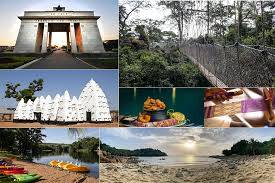Boosting Tourism in Ghana: Government Initiatives to Drive Economic Growth in the Eastern Region
Tourism is increasingly being recognized as a vital component of economic development in Ghana. With its rich cultural heritage, natural beauty, and historical significance, the country has immense potential to attract both local and international visitors. The government, in a bid to boost the tourism sector, has introduced various initiatives aimed at promoting tourism in different regions, particularly the Eastern Region, which is becoming a focal point for the country’s broader economic growth plans.
The Eastern Region, known for its lush landscapes, waterfalls, and historical landmarks, is receiving special attention from the government. The region is home to notable tourist attractions such as the Boti Falls, the Aburi Botanical Gardens, and the Akuapem Hills, which have long been admired for their scenic beauty. In recent years, the government has recognized the untapped potential of these attractions and is taking significant steps to develop the region's tourism infrastructure. This includes upgrading road networks, improving accessibility, and creating modern facilities that cater to the needs of tourists.
One of the government’s key initiatives is the development of eco-tourism projects, which align with global trends towards sustainable travel. By promoting eco-friendly tourism in the Eastern Region, the government aims to not only preserve the environment but also create new job opportunities for locals. This initiative is designed to empower communities, providing them with the tools and training needed to participate in the tourism industry, from guiding visitors to offering local crafts and hospitality services.
Another important aspect of the government’s strategy is the promotion of cultural tourism. The Eastern Region is home to several traditional festivals, such as the Akwantukese Festival and the Odwira Festival, which attract tourists looking to experience Ghanaian culture. The government is working with local communities to enhance the visibility of these events and create more immersive experiences for visitors. By investing in cultural heritage preservation, the government hopes to turn these festivals into key attractions that will draw visitors year-round.
These initiatives are part of a larger plan to stimulate economic development across the country. Tourism has the potential to create jobs, generate income, and increase foreign exchange earnings, all of which are crucial for Ghana’s continued economic growth. As the Eastern Region becomes a tourism hub, it will play a significant role in shaping the future of Ghana's economy, benefiting local communities and the nation as a whole.



No comments yet
Be the first to share your thoughts!